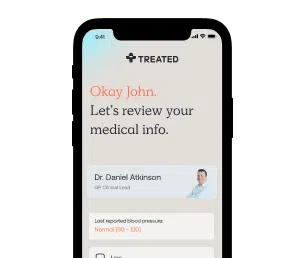Premature ejaculation
Treatments to help you last longer.
Secure delivery
UK clinicians
Premature ejaculation is when you ejaculate too early during sex. It can happen to anyone for a range of reasons, but if it happens a lot it can cause stress and put strain on your relationship.
Talk to us to get helpful, tailored advice, and we’ll show you what treatments are available so you can choose what’s right for you.
In short: ‘coming’ earlier than you’d like during sex. This can vary from person to person, and is really down to you and your partner to decide what you’re happy with. But the general feeling is that premature ejaculation can be defined by a short latency (time between starting and finishing sex), which you struggle to control and that causes distress.
There are two types:
No widely accepted ‘normal’ latency (normal time that it takes to ejaculate) exists, but an estimate suggests around 7 minutes for men without premature ejaculation, and just under 2 for men with it.
But, as we said earlier, this is more a question of whether you feel like premature ejaculation is causing distress and is getting in the way of you and your partners’ sex life.
Pretty common. It’s pretty difficult to get accurate data on just how common, as the definition can often be loose or subjective, and many men ‘suffer in silence’ - so estimates can range from 4%-66% of men worldwide - though most studies indicate that the number is between 25%-40%
Whatever the exact number, most men will have at least one premature ejaculation at some point in their lives. Most of the time it’s not a concern, and often it will only happen once or twice.
It’s really only a problem if it happens with enough frequency to cause further distress, disrupt your relationship, or has happened consistently since you’ve been sexually active.
There are things you can try before seeking medical help. Some men find it useful to masturbate around one to two hours before sex, or to use condoms (or thicker ones if you already do) to lessen sensitivity. You can also take breaks, change position, or try to think about something a little less exciting.
Also, if you’re in a relationship, there are things you can do with your partner to help to extend your orgasms. The two main recommendations are the ‘squeeze’ technique, and the ‘stop and start’ technique. Both of which involve stopping intercourse when you are close to climaxing, and starting again when you feel comfortable. But these take a lot of practice, and might not always work.
Failing this, there are treatments you can take which have been shown to help you to delay ejaculations.
One of the most common treatments for premature ejaculation are drugs called SSRIs (selective serotonin reuptake inhibitors). These were originally designed as antidepressants, but an unintended side effect of these was that they delayed ejaculation.
This happens because serotonin manages the transportation of pleasure signals around the body, and SSRIs increase the activity of serotonin within a certain point of the nervous system, which leads to the user having greater control over their orgasms during sex.
Because of this, SSRIs started to be recommended to people who were struggling with premature ejaculations, but they have to be taken daily and there is often a delay of 1 to 2 weeks before you feel the effects. More recently, an “on demand” SSRI has been licensed with the sole intention to help people with premature ejaculation: Dapoxetine (or Priligy). This is the only drug marketed at helping to prevent premature ejaculations.
EMLA is another possible treatment. This is a topical anaesthetic cream which will reduce sensation when applied to the penis. You may need to use a condom when using EMLA, though, as the cream can transfer to your partner when engaging in sex or foreplay, which can cause numbing and a loss of sensation for them.

How we source info.
When we present you with stats, data, opinion or a consensus, we’ll tell you where this came from. And we’ll only present data as clinically reliable if it’s come from a reputable source, such as a state or government-funded health body, a peer-reviewed medical journal, or a recognised analytics or data body. Read more in our editorial policy.
Most of the time the cause is psychological. This can be anything from depression or stress, to performance anxiety (particularly with a new partner). These can often be the reasons for acquired premature ejaculation. And although it may feel as though the problem will last forever, it can often only result in you suffering from premature ejaculation temporarily, or until the root cause is resolved.
But it can also be caused by factors that will more likely mean lifelong premature ejaculation. This can be biological things, like having a higher-than-normal penis sensitivity, or psychological reasons.

How we source info.
When we present you with stats, data, opinion or a consensus, we’ll tell you where this came from. And we’ll only present data as clinically reliable if it’s come from a reputable source, such as a state or government-funded health body, a peer-reviewed medical journal, or a recognised analytics or data body. Read more in our editorial policy.

How we source info.
When we present you with stats, data, opinion or a consensus, we’ll tell you where this came from. And we’ll only present data as clinically reliable if it’s come from a reputable source, such as a state or government-funded health body, a peer-reviewed medical journal, or a recognised analytics or data body. Read more in our editorial policy.
Have something specific you want to know? Search our info below, or ask our experts a question if you can’t find what you’re looking for.
Premature ejaculation: definition and prevalence. International Journal of Impotence Research, 18(S1), pp.S5–S13.
Recommendations for the management of premature ejaculation: BASHH Special Interest Group for Sexual Dysfunction. International Journal of STD & AIDS, 17(1), pp.1–6.
Comparison of the clinical efficacy and safety of the on-demand use of paroxetine, dapoxetine, sildenafil and combined dapoxetine with sildenafil in treatment of patients with premature ejaculation: A randomised placebo-controlled clinical trial. Andrologia, 50(1), p.e12829.
Priligy 30 mg film-coated tablets - Patient Information Leaflet (PIL) - (emc).
Ejaculatory dysfunction as a cause of infertility. Reproductive Medicine and Biology, 11(1), pp.59–64. doi:10.1007/s12522-011-0108-3.

Topical numbing cream, applied to the penis, to help you last longer in bed.

Desensitising spray that helps you last longer in bed.

An off label tablet taken in advance to help delay climax during sex.

Increases the time it takes to climax during sex. An off label tablet treatment.

A newer version of Cipramil. A pill taken a few hours before sex to help delay ejaculation.

A tablet that can help you last longer and give you more control. Preserves sensation.
A tablet that helps you last longer. Get better control of your sex life with Sertraline.

Registered with GMC (No. 4624794)
Meet Daniel
Registered with GPhC (No. 2202465)
Meet Sanjeda
Registered with GPhC (No. 2070724)
Meet Craig
Always read the leaflet that comes with your medication and tell us about any side effects you get.
We know health, but you know you.
Our experts tell you what’s safe, but you decide what’s best.
Answer a few questions and tell us about yourself. Get tailored advice from our clinicians so you can choose better.

Choose your treatment and how often you have it delivered.

We know things change. It’s the nature of life. We’ll check in regularly to make sure your treatment is still right for you.
Pause. Change. Skip. Start again. Any time you like.
Here are some other things we can help with.
Let’s make BPH treatment simpler. Get ongoing care from our clinicians, but without the hassle of appointments.
Tablets, creams, injections. Get expert advice and choose the ED treatment that’s best for your life.
All the info related to premature ejaculation you could ever need.
Take a look at our health guides.

There are several reasons why you might not be lasting as long as you’d like to. Scientists aren’t sure of exact causes, but a mix of biological and psychological triggers could result in finishing quickly.
Read moreWe're making healthcare more about you. Sign up to our newsletter for personalised health articles that make a difference.
Disclaimer: The information provided on this page is not a substitute for professional medical advice, diagnosis, or treatment. If you have any questions or concerns about your health, please talk to a doctor.
We couldn't find what you're looking for.
Here's everything we treat. Or, if you're looking for something we don't have yet, you can suggest something.
If there’s a particular treatment or condition you’re looking for, tell us and we’ll look into it for you.
Submit your question here, or tell us if you’ve found an issue on our site.
We’ll get back to you very soon. We aim to respond to all queries in one working day.
You’re signed up to our newsletter. Keep an eye on your inbox for our latest update.
By clicking 'Subscribe now' you're agreeing to our Privacy Policy.
We’ve sent you an email asking you to confirm your email address.